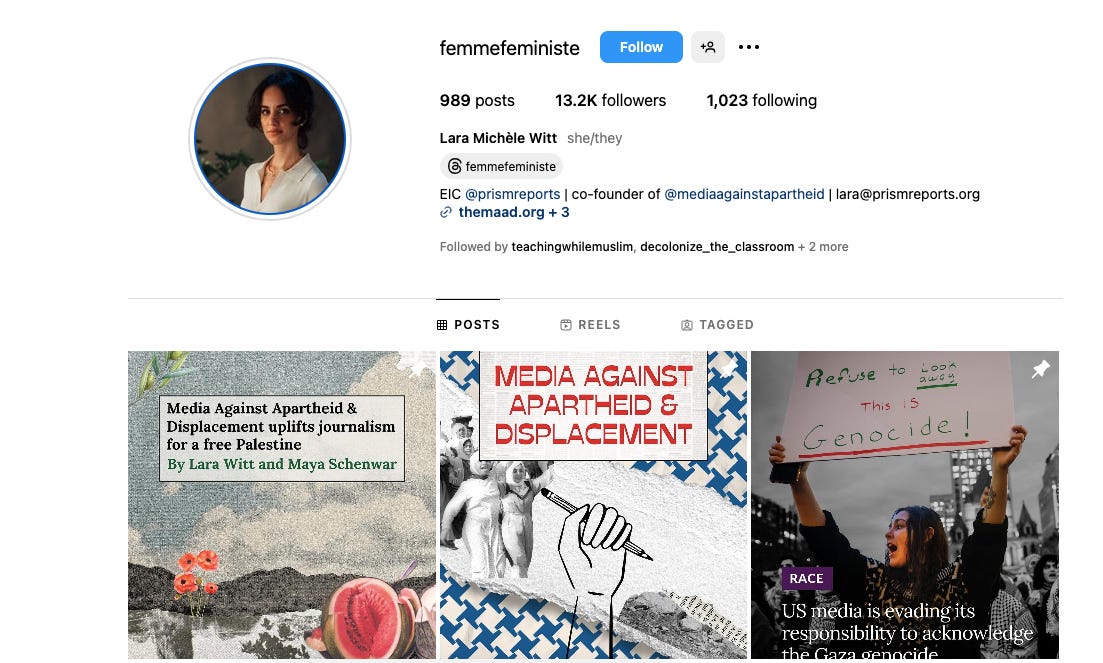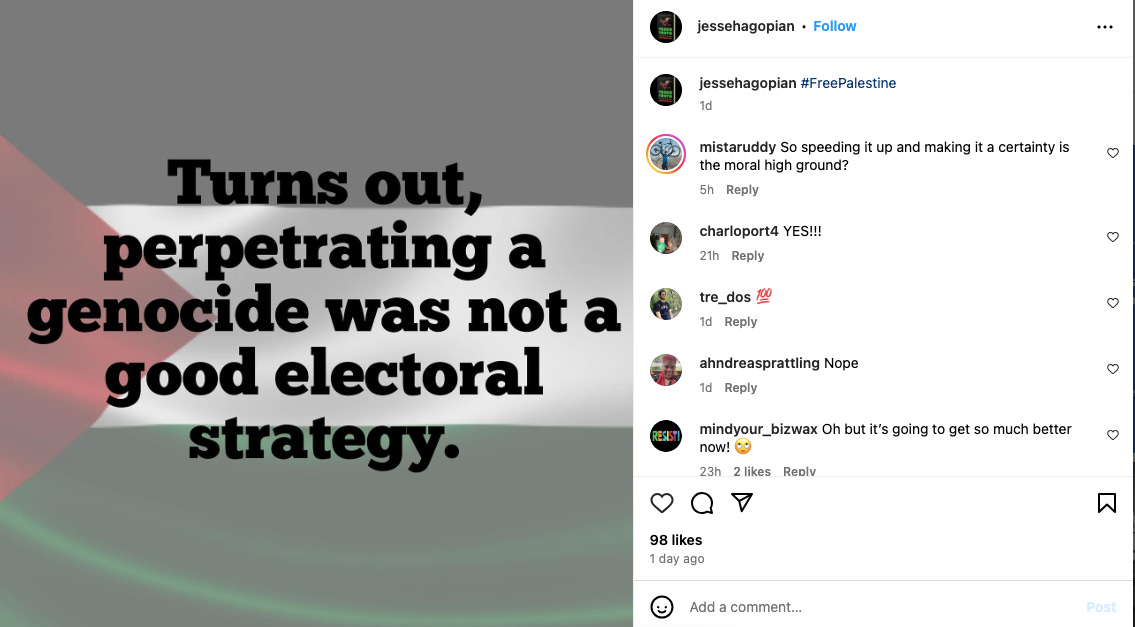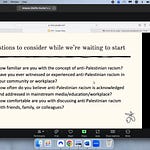Prism, a social justice media outlet focused on “collective liberation", and which breaks such stories as “Liberals stepped over the bodies of Palestinian women to vote for Kamala Harris” written by the moderator of this evening’s panel, Lara Witt, teamed up with Zinn Education Project to present a panel on how K-12 teachers teach “truth” in the classroom and help their students become politically conscious activists.
Moderator, in her “From Salish Seas to Palestine, Occupation is a Crime” shirt, Lara Witt, editor-in-chief of Prism
Panelists:
Jesse Hagopian - editor at “Rethinking Schools” and author of the upcoming book “Teach Truth: The Struggle for Antiracist Education.”
Key quotes from Hagopian during the panel:
“You’re either teaching for oppression or you’re teaching for liberation. And you have to pick a side.”
“Social justice pedagogy is what love looks like in the public schools.”
“In Gaza they’re facing scholasticide…here in the United States, we don’t have scholasticide but we are facing epistemicide - the destruction of ideas and knowledge.”
“Kids have a choice to make: They can join a long history of white supremacy or they can join the history of allyship. We empower those kids.”
Deana Forbes - social studies teacher at Freedom High School in Virginia.
“Standards have become a suggestion to me…I make it my business to make sure I share stories of people who look like [the students].”
"I'm not going to teach curricular genocide and not teach the truth."
Greg Wickenkamp - former 8th grade social studies teacher.
“White people are trapped in a history that we don’t understand, and until we understand that we’re not going to be free ourselves.”
Greg talks about Paulo Friere’s philosophy of using the classroom to awaken political consciousness.
"Teaching justice is always a challenge in an unjust society. The difference between teaching these things in a place like DC or in a place like Iowa is not one of substance, but of degree."
Dr. Chantee Earl - associate professor for the Department of Middle and Secondary Education at Georgia State Uni College of Education and Human Development.
"The Protect Students First act is not protecting students. We are constantly up against how to teach the true history, thing that are relevant culturally and historically, to the students in the classroom."
“This [legislative suppression] is what's happening, but it is not scaring us. We’re gonna continue to do the work because the work is necessary”
The Protect Students First act is legislation in Georgia. You can read the full bill here
The panel, dedicated to “teaching truth” are confused about what is meant by “divisive concepts” - “divisive for who” they ask?
Here is what the bill says on what constitutes ‘divisive concepts”
1) 'Divisive concepts' means any of the following concepts, including views espousing such concepts: (A) One race is inherently superior to another race;
(B) The United States of America is fundamentally racist;
(C) An individual, by virtue of his or her race, is inherently or consciously racist or oppressive toward individuals of other races;
(D) An individual should be discriminated against or receive adverse treatment solely or partly because of his or her race;
(E) An individual's moral character is inherently determined by his or her race;
(F) An individual, by virtue of his or her race, bears individual responsibility for actions committed in the past by other individuals of the same race;
(G) An individual should feel anguish or any other form of psychological distress because of his or her race;
(H) Performance-based and merit-based advancement policies and practices are racist;
(I) Any other form of race scapegoating or race stereotyping
It goes on:
'Espousing personal political beliefs' means an individual, while performing official duties as part of his or her employment or engagement with a school or local school system, intentionally encouraging or attempting to persuade or indoctrinate a student, school community member, or other school personnel to agree with, adopt, or promote such individual's personal beliefs concerning divisive concepts.
(3) 'Race scapegoating' means assigning fault or blame to a race, or to an individual of a particular race because of his or her race. Such term includes, but is not limited to, any claim that an individual of a particular race, consciously and by virtue of his or her race, is inherently racist or is inherently inclined to oppress individuals of other races.
(4) 'Race stereotyping' means ascribing character traits, values, moral or ethical codes, status, or beliefs to an individual because of his or her race.
(d) Nothing in this Code section shall be construed or applied to:
(5) Prohibit the discussion of divisive concepts, as part of a larger course of instruction, in a professionally and academically appropriate manner and without espousing personal political beliefs;
(7) Prohibit the use of curricula that addresses the topics of slavery, racial oppression, racial segregation, or racial discrimination, including topics relating to the enactment and enforcement of laws resulting in racial oppression, segregation, and discrimination in a professionally and academically appropriate manner and without espousing personal political beliefs
Dr. Tamyka Morant - assistant principal at Bruce Monroe Elementary School - Park View, Washington DC.
Morant answered a question about how to bring liberatory practices to subjects like Science














Share this post